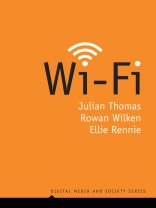From café culture to home schooling, remote community networks, and smart cities, Wi-Fi is an invisible but fundamental element of contemporary life. Loosely regulated, low-cost, and largely overlooked by researchers, this technology has driven the rise of the smartphone and broadband internet, and is a vital element in the next wave of automation.
Thomas, Wilken, and Rennie provide the first comprehensive account of the social and cultural consequences of Wi-Fi, highlighting the ways in which it has changed our homes, communities, and cities. They discuss its origins as an experimental technology, the conflicts generated around its ownership and control, and the ideas and expectations attached to it by technologists, activists, and entrepreneurs. The authors reveal the ways in which Wi-Fi is an inherently social and political technology, animated by conflicting aspirations for local, public, and community control, and defined by private and corporate interests. As this book shows, Wi-Fi has extended and intensified our online lives while also promising a more inclusive internet.
Wi-Fi is essential reading for students and scholars of media and communication, as well as anyone who wants a better understanding of this ubiquitous and influential technology.
Mục lục
Acknowledgments
List of Figures
1. Why Wi-Fi Matters
2. Infrastructure
3. Home
4. Community
5. City
6. Problems, Prospects, Possibilities
References
Index
Giới thiệu về tác giả
Julian Thomas is Director of the ARC Centre of Excellence for Automated Decision-Making and Society at RMIT University.
Rowan Wilken is Principal Research Fellow in the School of Media and Communication at RMIT University.
Ellie Rennie is Principal Research Fellow in the School of Media and Communication at RMIT University.












